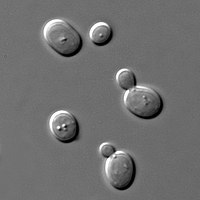
Photo from wikipedia
Winemaking is a dynamic and complex process in which ethanol concentrations gradually increase to reach >10% (vol/vol) through alcoholic fermentation. However, there is little information on protein damage in wine… Click to show full abstract
Winemaking is a dynamic and complex process in which ethanol concentrations gradually increase to reach >10% (vol/vol) through alcoholic fermentation. However, there is little information on protein damage in wine yeast during winemaking. ABSTRACT Under laboratory conditions, acute 10% (vol/vol) ethanol stress causes protein denaturation and accumulation of insoluble proteins in yeast cells. However, yeast cells can acquire resistance to severe ethanol stress by pretreatment with mild ethanol stress (6% vol/vol) and mitigate insoluble protein accumulation under subsequent exposure to 10% (vol/vol) ethanol. On the other hand, protein quality control (PQC) of yeast cells during winemaking remains poorly understood. Ethanol concentrations in the grape must increase gradually, rather than acutely, to more than 10% (vol/vol) during the winemaking process. Gradual increases in ethanol evoke two possibilities for yeast PQC under high ethanol concentrations in the must: suppression of insoluble protein accumulation through the acquisition of resistance or the accumulation of denatured insoluble proteins. We examined these two possibilities by conducting alcoholic fermentation tests at 15°C that mimic white winemaking using synthetic grape must (SGM). The results obtained revealed the negligible accumulation of insoluble proteins in wine yeast cells throughout the fermentation process. Furthermore, wine yeast cells in fermenting SGM did not accumulate insoluble proteins when transferred to synthetic defined (SD) medium containing 10% (vol/vol) ethanol. Conversely, yeast cells cultured in SD medium accumulated insoluble proteins when transferred to fermented SGM containing 9.8% (vol/vol) ethanol. Thus, wine yeast cells acquire resistance to the cellular impact of severe ethanol stress during fermentation and mitigate the accumulation of insoluble proteins. This study provides novel insights into the PQC and robustness of wine yeast during winemaking. IMPORTANCE Winemaking is a dynamic and complex process in which ethanol concentrations gradually increase to reach >10% (vol/vol) through alcoholic fermentation. However, there is little information on protein damage in wine yeast during winemaking. We investigated the insoluble protein levels of wine yeast under laboratory conditions in SD medium and during fermentation in SGM. Under laboratory conditions, wine yeast cells, as well as laboratory strain cells, accumulated insoluble proteins under acute 10% (vol/vol) ethanol stress, and this accumulation was suppressed by pretreatment with 6% (vol/vol) ethanol. During the fermentation process, insoluble protein levels were maintained at low levels in wine yeast even when the SGM ethanol concentration exceeded 10% (vol/vol). These results indicate that the progression of wine yeast through fermentation in SGM results in stress tolerance, similar to the pretreatment of cells with mild ethanol stress. These findings further the understanding of yeast cell physiology during winemaking.
Journal Title: Microbiology Spectrum
Year Published: 2022
Link to full text (if available)
Share on Social Media: Sign Up to like & get
recommendations!